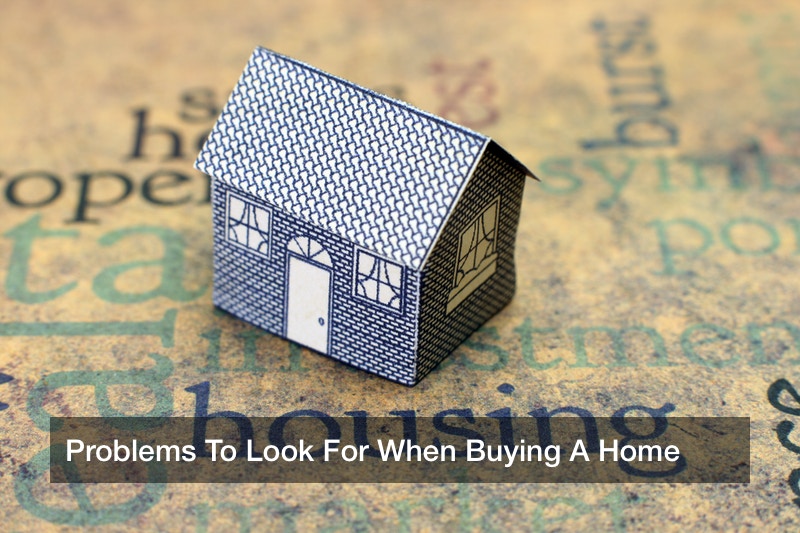
Moving and purchasing a new home is a big change that requires a lot of different steps that ensure that it goes smoothly. You have to find a buyer for your previous home, find a new home in an area that is close to your job, in a good school district, is the right size for your family, falls in your budget, the list goes one. As you are moving through all of the different steps, one that you don’t want to miss is inspecting the place for new home issues that you may face. Here is a list of common new home issues to look for as well as what you should do to fix them if you encounter them.

Roofing
One of the number one new home issues homebuyers encounter is roofing issues. That’s why you should make sure to have the roof inspected before you buy the home. Depending on the age of the home and the last time it was remodeled the roof could have some serious issues. Even if the roof was recently redone, the roof installation could have been done incorrectly. If you have purchased a home and afterward discover that there are roof issues, there are a few steps you should make to ensure that it’s repaired and that you won’t face issues moving forward.
Some as simple as roof shingles missing could mean there are bigger problems underneath the top layer. Common new home issues that arise from poorly installed roofing or old roofing are:
- Leaks: Leaks in your roof could cause a lot of problems. Wood could start to rot, wires could get wet and either stop working or spark and cause fires, installation could get damaged, the list goes on.
- Pooling Water: On flat roofs, a big issues is pooling water. This can cause leaks, or even an entire portion of your roof to crash in. Make sure to look for a home with sloped roofs to avoid this problem.
- Roof Shrinkage: Depending on the material used to build your roof, you could deal with shrinkage. This leads to faster deterioration of the roof, cracking, leaks, and more.
- Weather Damage: Regardless of whether your roof was installed correctly, it will face damage from the elements. Older roofs will have less integrity and are more prone to cracking and letting water in.
The typical homeowner plans to spend over $10,000 on a home renovation, and if you find issues with your roof, a large portion of your budget will go to that project. If you stick with the most budget-friendly options, you can expect to be spending around $5,000-$8,000 on a new roof. As you are making decisions, make sure to work with a commercial roofer to have professional help in deciding on the options that match your budget but will also give you the most bang for your buck and be long-lasting.
If you find roofing problems when checking for new home issues, you’ll need to weight the price and time it will take to make repairs to the value of the home you’re considering.
Once you have replaced your roof or if you’re lucky enough to find a new home that doesn’t have issues, make sure to have regular checks done to ensure that there are no new problems. It’s much better to find issues early on than wait a few months down to road after there are more underlying problems. Find a residential roofing services company in your area and talk with them about the best check-up schedule for your roof.

Plumbing
After roofing, next on the list of most common new home issues is plumbing problems. Because plumbing is all underground or hidden in the walls, it may be difficult to tell there is an issue until it’s too late. This is why it’s very important to have your home inspected before you sign off on any papers. The cost of plumbing fixes can add up very fast. Depending on the fixes you’re facing, the total cost may be a deciding factor in not buying the home. Here are some of the most common plumbing issues an inspector could find while inspecting a home:
- Main Sewer Line Clog: A clog in your main sewer line makes it difficult for waste to exit your home. It can cause backups that burst pipes or cause leaks. If it goes on for a prolonged amount of time, it can cause standing water that leads to rotting and even issues with the foundation of your home depending on where the sewer line is located.
- Leaks In The Walls: Leaks in walls can go undetected for a long time until the water starts seeping through or other major problems arise. They also lead to an increase in your water bill. The water will destroy drywall, flooring, rot wood, and cause mildew. Inspectors have tools that help them find these leaks and avoid purchasing a home with huge problems just behind the walls.
- Lead Pipes: If the home you’re purchasing was built before the 1960s, you may have galvanized pipes, otherwise known as lead pipes. The pipes are covered with a protective layer of zinc, but as that erodes, lead could get into your water stream meaning you and your family would consume it every day. Consuming excess amounts of lead in adults could lead to cardiovascular diseases, decreased kidney function, and a poorly functioning reproductive system. For children, the issues could be even worse.
- Water Heater: When you get your home inspected for plumbing, make sure that the inspector also checks out the water heaters. Water heaters do just as their name suggests, they heat the water used in your home. But issues like having an old water heater, or one that’s the incorrect size for your home can be an issue. If the water pressure in your home is suffering from other sources, it could be hard on your water heater and create irreversible damage.
Because the cost to fix plumbing issues adds up so quickly, the solution is to be proactive about preventing these issues and checking for them frequently. Working with a local plumbing service to check areas to have had problems in the future, or just to perform regular checkups. Consider that the longer you let a problem go, the more the total price tag for the repairs adds up.
When you’re checking for common new home issues like plumbing, if you find a home that has lots of damage, you may want to seriously reconsider purchasing that home, to save yourself not only time and money but also a lot of stress.

Electrical Work
Another common item on the list when checking for new home issues is electrical work. Depending on the age of your home, having an electrical system that basically functions may not even be enough. Systems in older homes were not created to hold up with computers charging, TVs running, HVAC systems working, and all the other home appliances at the same time. People use a lot more electricity than they used to and the system in your house needs to be prepared to hold up for you and your family.
Hiring an inspector to check the type of electrical system you have in the home you are considering will save you a lot of time dealing with issues in the future. Certain electrical systems can lead to issues with not only running all the appliances you need, but also being more susceptible to damage from corrosion, and pests. For example, a knot and tub wiring system was prevalent for homes built up to the 1930s. Some of the most common issues with this type of system are higher risk of heat and fire damage when a lot of electricity is being used at once, insulation in it turning brittle very easily, and that nowadays, homeowners have a very hard time getting homeowners insurance when they have this system.
If you are set on a vintage home that has this type of system, you will want to talk with a custom home building services company in your area. This kind of project will require professional help to update your home’s electrical system while also keeping its vintage charm.

HVAC
Among common new home issues, one of the more serious is problems with the HVAC system. Whether the system hasn’t been replaced or hasn’t had maintenance in a while, you will want to have it inspected before you purchase your home. The last thing you want is to be surprised by issues and stuck with a lack of heating and air conditioning when you need it.
Some of the most common issues inspectors may find with an HVAC system are:
- Dirty Filter: As your HVAC system runs, the filter is bound to collect dirt and dust. If the filter hasn’t been replaced, the air that runs through will start to get a musty smell. It could also start to mold which is dangerous to breathe in and can cause respiratory issues for anyone living in the home.
- Thermostat Malfunctions: A broken thermostat may not be especially dangerous, but it will lead to your furnace not working properly. This could also impact your energy or gas bill in the long run.
- Gas Leaks: Because a furnace generally runs on gas, a leak in any of the piping could be seriously dangerous for your health. If there is a leak, you will usually smell rotten eggs. However, if the leak is very small, it may be difficult to detect the rotten egg smell and could lead to you breathing in gas over an extended period of time.
- General Lack Of Maintenance: An HVAC system that hasn’t had regular HVAC services and maintenance performed could lead to a variety of problems. The system will start to break down and cost more to repair. It could also equal more on your energy bill and just not function as it should. The worst thing is having a broken or poorly functioning air conditioner on a hot summer day.
- Water Leaks: Air conditioners and furnaces both produce condensation as they work. Furnaces have a special drain pipe connected to move the water away, but if that pipe gets clogged or damaged, it can cause leaking. Depending on where the leak is located, some of the hazards can be mold buildup or rot in any wood the water is leaking on.
HVAC repairs can be expensive. As you have an inspector check for common new home issues, make sure to have every aspect of your HVAC checked out to ensure that there aren’t any hidden problems.
If you are faced with repairs or replacements of elements of your HVAC system, you may also consider some more energy-efficient options. For example, a heat pump is a great alternative for furnaces and air-conditioners. You will just want to make sure that you get regular maintenance and heat pump repair done just as you would for a furnace or air conditioner to keep it running properly.

In Conclusion
As you are having a house inspected for common new home issues, keep these previously listed in mind. As you weigh out the pros and cons of purchasing a home that has these kinds of issues, you’ll need to consider the cost of the repairs, the time it will take to make them, and whether or not you’ll be able to still live in your home while they’re being done. While these common new home issues may be expensive to repair, the value of the home you’re considering, including size, location, and style, may be worth it. Just make sure you have them properly inspected before you sign off on the home.




